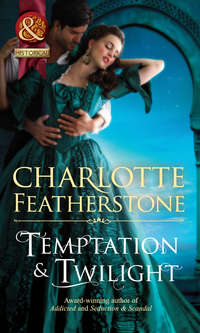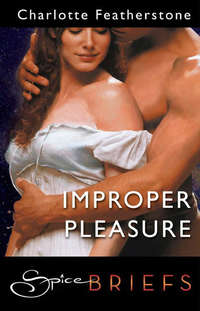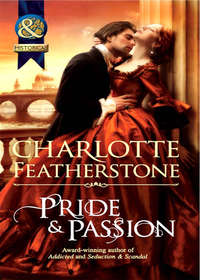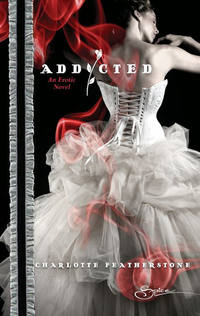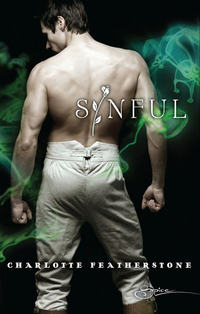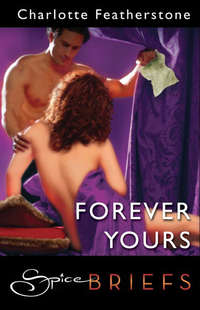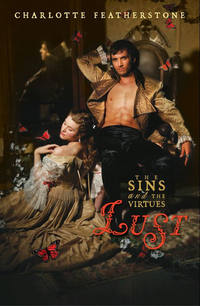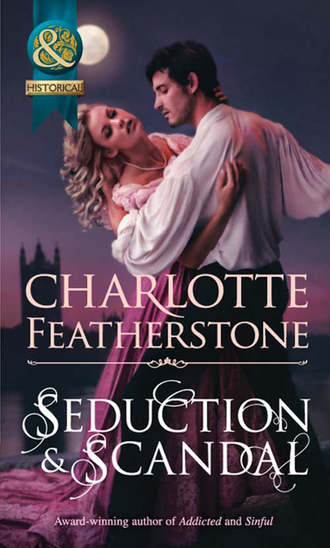
Полная версия
Seduction & Scandal

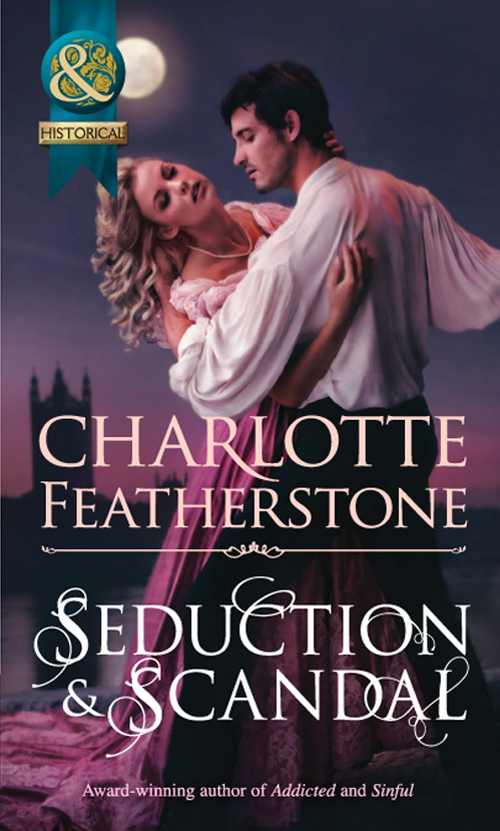
Praise for the work of Charlotte Featherstone
ADDICTED “A wonderful old-fashioned love story is at the very heart of this novel. Agreeably outside of the norm with its damaged hero, it also has plenty of sizzle and emotional clout.” —RT Book Reviews
“Ms Featherstone, will you be writing about any of the other characters in future novels? I hope so; the characters you’ve built in Addicted have very likeable, very human personalities … Your novel was an easy and an especially enjoyable read.” —Night Owl Reviews Top Pick!
SINFUL “Pairing a tortured hero and a strong-minded heroine creates a dynamic conflict and off-the-charts sexual tension. Throw in lots of witty dialogue and a non-traditional happy ending, and you’ve got a keeper.” —RT Book Reviews Top Pick!
“[Featherstone] manages to weave an interesting tale, combining sizzling sex scenes with characters deeply rooted within their sexual identities … I’m impressed with what [Featherstone] has to offer in the romance world.”
—Dear Author
LUST “Featherstone knows how to write sexy in this unusual tale of the fey. Thane’s seduction of Chastity is titillating and is complemented by the other well-written characters and their relationships.” —RT Book Reviews
“This was the first time I have read a Charlotte Featherstone book; I can safely say that it will not be the last … Now I just have to be patient and wait for the next Sin to find his Virtue …”
—Forbidden Reviews
Don’t miss The Brethren Guardians series!
Seduction & Scandal August 2012
Pride & Passion September 2012
Temptation & Twilight October 2012
Seduction & Scandal
Charlotte Featherstone

This book is dedicated to my granny MacAlpine, and all the ancient Scots who weaved their stories and shared them, passing them down for the next generation to enjoy and share.
Had it not been for Janet and Death’s story, told to me when I was a child, this book would never have been written! I made it my own, Gran, and hope you won’t mind that Janet is Isabella, and that instead of moving Death to tears with her song, she does so with her words.
Till we meet again….
And to Beth, from the Pussycat Parlor, for that oh so inspiring picture of Lord Black! You’re the best!
I am the fog, mist and rain, the shadows that creep across your windowpane.
I am darkness and disease, the entity whom all fear to see.
I am hate, dread, rage, all humans pray to keep me at bay.
I am sorrow and loneliness. Emptiness and despair.
I am, and will be, your last breath of air.
In the end it is you and me, and our walk of darkness where I will set you free.
Side by side we will go, we’ll touch hands, mine will be cold.
You will look at me, and say, “Please, Lord Death, don’t take me away.” And I will reply, as I always do, “Nothing can sway me, pray do not try, for I have seen millions cry. Their tears, while soft, cannot break through this iron heart.”
I am Lord Death, bound by command, to steal life from those souls who have reached their end. I am Lord Death, a shadow of fear, a man say some, a demon cry most.
I am Lord Death, and this I will say, one day you and I shall walk the path of eternal darkness.
CHAPTER ONE
London, 1875
The first time I met death, it was at a ball and we danced a waltz. Beneath the glittering chandeliers, and amidst the swirls of ball gowns, their silk trains decorated with pearls and lace, Death guided me in sweeping circles until I was dizzy and breathless and all the other dancers had seemed to melt away, leaving only Death and myself whirling on the dance floor.
I should have feared him and his steely embrace, but I did not. Death had been by my side for so many years that I felt a kindred spirit in him. I have seen Death. He is beautiful in his severity, heartrending in his coldness. A dark, shadowy specter whose web draped like an ethereal veil over the mortals he would one day lay claim to.
A man in every appearance, whose isolation and loneliness he could not hide. It shone in his eyes, which were a mesmerizing dichotomy of coldness and warmth. His irises were a light shade of blue with the faintest chips of pale green, reminding me of the turbulent, chilly waters of the North Sea. But his lashes, thick and luxurious, and black as a raven’s feathers, put me in mind of a sable wrap, warm and comforting and soft—so supple and inviting. His hair was just as dark, inky and shining as it hung to his shoulders, like a pelt of fur. I yearned to run my fingers through the long strands, burying them in the thick suppleness and warmth.
“Do you know who I am?” he asked me, his voice deep and velvety. It slithered along my pores, awakening a deep feeling inside me—not fear, but something else. Something that made me warm and languorous, and as though my will were no longer my own.
“Lord Death,” I replied in a breathless whisper.
“And do you not fear me?”
I looked up, held his icy blue gaze steady. “No. I do not.”
He pulled me closer, till our chests meshed and our bodies danced, pressing and moving as if as one. It was indecent. Hedonistic. Exhilarating. My pulse raced, heating my skin. He found the frantic beating in my throat, his gaze lingered there and I knew then that he could snuff the warmth that was climbing steadily inside me.
“Have you come to claim me, Lord Death?”
His gaze slowly lifted to mine, and the thick, onyx lashes lowered, casting a hood over his eyes. “I have. Will you come with me now?”
We finished the turn and he took me by the hand, threading his fingers through mine, guiding me toward the French doors and the velvet blackness beyond.
I followed him willingly, his beauty beckoning me, and like a sleepwalker, I trailed beside him, compelled by something I could not name.
“Am I to die?” I asked, and he stopped, raised our joined hands to his mouth and gently kissed my knuckles.
“You are, my love, and in your sleep, you will become Death’s bride.”
“And that is it?” cried Lucy as she threw a pillow at Isabella. “You fiend!”
Lucy rushed to the dressing table where Isabella sat and pulled the black leather journal from her hand. Flipping through the pages, Lucy searched frantically for more.
“I told you, Luce, that I had only just begun the story.”
Lucy looked up from the book, her cheeks flushed with excitement. “I was just about to swoon when you ended it. I vow I am in love with Death!”
A tremor of pride curled within Isabella as she accepted the volume back from her cousin. “Do you think it’s that good?” she asked, feeling nervous as she gazed down at the words she had written. “I will admit it is a rather strange concept.”
“Good? Gracious, Issy, you’ve outdone yourself with this one. Not even Mr. Rochester is as gloriously brooding as your Lord Death.”
Smiling, Isabella tucked her journal and pencil into the seed-pearl reticule she was using for the night. “I could never outdo Mr. Rochester, Lucy. Charlotte Brontë has penned an unsurpassable hero with him.”
“Death, with his black hair and pale blue eyes …” Lucy murmured, closing her eyelids as she began to dance around the room, as though she was waltzing. “He is every maiden’s dream. To be swept up into the arms of a man focused solely on you … Issy,” she said, stopping before her. “It’s perfection.”
“I must confess, I do rather like the opening.”
“Oh, don’t be so modest,” Lucy ordered as she glanced in the mirror and replaced a few wayward auburn ringlets, “it’s only me. You can say you think it’s a smashing opening, and I will wholeheartedly agree.”
Hiding her grin, Isabella turned on the little stool and straightened the amethyst-and-diamond necklace that adorned her throat. It had been a gift from her uncle, and she wore it whenever possible. Never could she have imagined wearing something so beautiful—and expensive.
Her hair could use a fixing, she noticed, but there wasn’t much that could be done with the riotous flaxen curls that enjoyed springing from their pins. She had been able to cover up most of her past, to bury her common roots and essentially make a silk purse out of a sow’s ear, but her hair, it seemed, had other plans. It would not obey and she hid her smile, realizing that bit of tough Yorkshire stubbornness would not be stretched, ironed or pulled out of her. At least not yet.
“Tell me about your heroine, Issy, the woman who is to capture Death’s heart.”
Isabella frowned. That was the strange part. She hadn’t really put much thought into the woman who was to be Death’s bride. The opening had come from someplace deep inside her, the words spilling out from her soul. She did not want to look too deeply there, afraid of what she might see of her past—or perhaps it was the future she feared?
Lucy caught her scowl, and lowered her head, so their temples were touching as they looked at their reflections. “Or are you Death’s heroine, Issy?”
Isabella’s mouth fell open and Lucy laughed as Isabella flushed furiously. “Don’t be silly, Lucy.”
Her cousin gave her a dubious look. “You naughty little girl, penning such a thing.”
Had it been her in that opening? Had it been herself she’d envisioned, had written about dancing indecently with Death?
She was no stranger to him, that was for certain. But to write him as a hero? As someone who could lure and seduce … someone to be desired, and not reviled …
“You know I’m only teasing,” Lucy said. “For heaven’s sake, Issy, do not be so temperamental. I can’t abide that in artists. That’s why I broke off my flirtation with Eduardo. He was too moody for my tastes.”
“Well, what did you expect?” Isabella mumbled, finally recovering from her shock that she might possibly be the heroine in her story. “You met him at a séance.”
Lucy’s emerald-colored eyes flashed with excitement. “And there’s going to be another one in a few days. Say you’ll come, Issy.”
It wasn’t as though she didn’t have loved ones she’d dearly love to connect with in the spirit realm. Her mother, grandmother and now her aunt. They had all been taken from her, and each time she had felt Death’s shadow, standing quietly in the corner, waiting to take them.
Perhaps it was just her overactive imagination, but each time she had fancied that she had seen Death with her own eyes. Of course, she had never dared to admit such a thing. For who would believe her? Still, a part of her feared she really could see Death, and that part absolutely refused to attend a séance with Lucy, for fear the Grim Reaper would present himself.
“Well?” Lucy prodded. “If nothing else, it’s a good night away from balls and soirées. You might even think of it as research for your book. Bring Mr. Knighton if you wish.”
“I don’t think the curator of medieval studies at the British Museum would be very interested in a séance, or chair tipping, or communicating with spirits while using a talking board.”
Lucy huffed as she pulled on her long leather gloves.
“What you see in that stuffed shirt, I’ll never understand.”
“He’s very kind. And … and I think him handsome.”
“I’ll give you those two, but I would like to remind you that he’s rather boring in his conversation, and that he’s probably not going to look upon your dream of being a lady novelist with a kind eye. The academic sort never do,” she reminded her. “Knighton is a scholarly fellow in a scientific, hard-facts sort of way. Novels are made up stories, after all. I doubt Knighton could wrap his rather well-formed brain around that fact to grasp the delight to be found in them.”
“What is it you are trying to say, exactly, cousin?”
Lucy’s gaze softened. “That he is likely not going to be able to understand your brilliant mind, Isabella. He deals in facts, and you delight in fantasy. You’re opposite in every respect.”
Isabella dropped her gaze to her hands, where they folded primly in her lap. The jet bracelet that held the key to her journal caught her eye, and she brushed her thumb over the shining black stones. “It would do me well to give up this fantasy I so enjoy. Perhaps that is what I need, Lucy, a man who keeps me planted on earth, not in the ethers of some magical realm.” Shrugging, she glanced up to see her cousin watching her with what Isabella imagined was sympathy. “It hardly matters. The chance I will be published is very slim, Lucy. It’s really only a hobby.”
Lucy lifted Isabella’s chin with her slim fingers and gazed down upon her with her brilliant green eyes. “Repeat after me. I, Isabella Fairmont, will finish this book and submit it to every publisher in London—”
“And New York,” Isabella reminded her.
“And New York,” Lucy added. “And I will not rest until I see it published. I will not give up on my dreams.”
Isabella stood and hugged Lucy who, although she was her cousin, was more like her best friend. They were sisters of a sort, now that Isabella had come to live with Lucy and her father. “I promise you, Luce. I will finish it, and it will find a home. And I will make Mr. Knighton a devotee of the fictional world if it’s the last thing I do.”
“And you must promise to read to me, every night when you’ve written something new.”
Isabella flushed. “You only want the parts that speak of breathlessness and heaving bosoms.”
“Well, of course,” Lucy drawled. “Why else does one read a novel? Now then.” Lucy sighed. “Let us go downstairs. We’re already late and Papa will be snorting with indignation. We must not keep the Marquis of Stonebrook waiting.” Lucy shook her head, although she was grinning. “Papa is such a pompous aristocrat.”
Yes, the old marquis was rather self-important, but he was a good man. He had taken Isabella in, his niece by marriage, despite the scandal of her parents’ nuptials. He had clothed her, protected her and Isabella loved him like the father she never knew. He had saved her from an uncertain future and from herself. She owed her uncle more than she could ever repay. Still, she missed the comfort of her mother’s stories, and her grandmother’s arms. She missed Whitby with its dark and forbidding abbey, and the mist that rolled in from the sea. She missed the heather-covered moors, and the rocky cliffs that stood tall and proud against the foamy, turbulent waves of the North Sea. She missed home, and everything about it.
She missed them.
How dearly she longed to see her mother and grandmother again, and Isabella felt her eyes begin to well with tears. Thankfully Lucy’s voice drew Isabella out of her thoughts. “My feet ache already just thinking of the night ahead of us. Dear me, Issy, I’m tired of the social whirl.”
Whitby forgotten for now, Isabella strived for composure. “I am as well, Luce. I would pay a very high price for a chance to stay in my room and sit at my desk and write until my fingers are blackened with ink.”
“As much as I’d like more of Death, Issy, it’s pertinent we make an appearance at my father’s ball.”
“You know, when I was a young girl, I envied you your life, the gowns, the balls, the suitors … Now, I’m not so certain you had it better than I.”
Lucy tossed her a cheeky smile over her shoulder as she headed for the door. “I always envied you your cozy cottage and the meadow and woods where you and the other children from the village ran and played without any concern for deportment. You had a childhood, Issy. Something I never did.” Lucy tipped her head and smiled. “I’ve always been envious of that. And here we were all this time, feeling resentful of the other. It’s ironic, isn’t it?”
“It is, indeed, for I’m sitting here loath to go to a ball, something I’ve always dreamed about.”
“Chin up,” Lucy ordered. “There could still be light at the end of the tunnel for this night. Perhaps you can write more of your book. Our ballroom has many private corners, you know.”
“And of course that will have the suitors flocking to my side,” Isabella muttered ungraciously. “Men adore lady novelists.”
“I bet Lord Black does.”
Isabella sent her cousin a glare before she reached for the ivory gloves that sat atop her dressing table. “How could you suppose such a thing, Luce? Lord Black never comes out of that mausoleum he calls a town house.”
Lucy stopped at the threshold, and slowly turned, the salmon-pink silk of her gown’s elaborate train wrapping around her legs. “I saw him last night.”
“Fibber! You did not!” Isabella challenged.
“I did, I swear it. I couldn’t sleep after the Anstruther soirée. I was sitting on my window box, gazing out at the stars when I saw those massive iron gates swing open. A carriage, black and shining and led by four black horses, came clattering out of the drive. The conveyance lingered for a moment, and then I saw it, a shadow that was illuminated by the lanterns. It engulfed the interior, like spilt ink, and then I saw him, his pale face appeared in the window, and he was looking up, and I swear his gaze lingered on the window beside mine—your bedroom window, Issy.”
“Nonsense,” Isabella scoffed.
“It’s the truth.”
“I think, Luce that you should take up novel writing with me. You’ve the imagination for it.”
“Think what you like, Isabella, but I know what I saw. And you mark my words, our neighbor will be here tonight. The Marquis of Stonebrook will have it no other way, I assure you.”
THERE WAS ONE THING that had surprised Isabella after coming to live with her uncle, the Marquis of Stonebrook, and that was the strange fact that she rather despised balls.
For most of her girlhood, she had sat on the weathered window bench of the small cottage her mother rented, thinking of her beautiful cousin, laughing and flirting and dancing around the Stonebrook’s glorious ballroom, wearing an outrageously expensive gown. Her young heart had ached with longing. She had wanted to attend a ball. To wear a stunning gown. To have a handsome suitor.
It was rather satirical that now, after she possessed all three, she had no taste for it. She would have much preferred curling up before the large hearth in her room, wearing her old flannel nightrail, writing her stories—just as she had before Stonebrook and Lucy had come to Whitby to bring her back to London.
The wonder and novelty of town life had soon worn thin. There had been so many balls this past week, despite it being October. It seemed that the aristocracy no longer found it necessary to depart for their country estates at the end of the season as they did in the past. Perhaps it was because the nouveau riche rarely ever left London. An aristocrat could hardly marry off his titled daughter to a wealthy businessman if he was up in Yorkshire with sheep and trees.
No, the marriage mart had extended well beyond the traditional season. And this season, it was no secret that the Marquis not only wanted to marry off his daughter, but his niece, as well.
Isabella had been taken with the idea at first. The romance of a courtship, rides in the park, the soirées, the balls, the musicales. It had not taken long before she realized that the thought of going out yet another night provoked her to distemper. Not even Lucy who had been born and raised in this way of life enjoyed the endless parties.
They were a fine pair, Isabella thought, as she slipped the delicate silver strap of her reticule higher onto her wrist. Lucy was content to pursue her interest in the occult, and Isabella was happy writing the stories that constantly filled her head. Both of them were originals, and nothing like a young lady of good breeding should be. Perhaps both of them had inherited Isabella’s mother’s taste for shunning the ideals of what made a woman a proper lady. Lord knew her mother had been nothing like her sister. Aunt Mildred had always been frightfully proper—haughty, even. So unlike Isabella’s mother who shunned society’s rules. Lucy, Isabella thought, very much reminded Isabella of her own mother—both in looks and temperament. She wasn’t the only who had thought so, either. Aunt Mildred had despaired of Lucy becoming just like her “fallen unfortunate sister.” That fear had been so great that upon Lucy’s tenth birthday, Aunt Mildred had refused to come to Yorkshire to visit them. They had been kept separate after that, lest Lucy catch the wanton, wild streak Isabella’s mother had never outgrown.
There hadn’t ever been any fear that Isabella would end up like her mother. She had learned a hard lesson, from a very young age. She would not follow her mother’s footsteps.
“My toes are already pinched,” Lucy hissed into her ear as they stood and watched the swell of dancers waltzing around the overly hot room. “And I fear my forehead is glistening.”
Isabella studied Lucy. “Only a titch. Can you discreetly wipe it?”
“Not likely. I feel like all eyes are on us.”
“Not us, you, sweetie,” Isabella murmured. “I think they’re waiting to see if the Duke of Sussex will come up to scratch tonight.”
“Good Lord, let us hope not,” Lucy moaned as she furiously beat the air with her fan. “I cannot for the life of me imagine His Grace at a séance.”
Hiding her laugh behind her hand, Isabella stood on tiptoes, searching for the duke who had become increasingly more ardent in his pursuit of her cousin. He glanced their way, and immediately his expression changed from feigned politeness to brooding. Sussex certainly could brood, and he looked immensely handsome while doing so. Why her cousin could not see this, Isabella had no idea. The way he stared at Lucy was positively worthy of a dramatic swoon.
“Do you like him, Luce?”
“He’s handsome. Rich. Titled. He has at least four estates spread throughout the kingdom and I hear he’s a bit of philanthropist to boot—belongs to all sorts of charities and committees to better the ordinary man and those less fortunate. A virtual paragon,” Lucy muttered as she glanced away from Sussex’s prolonged stare. “Of course I should like him, but I confess that I do not feel much more than friendliness toward him. He’s too shiny,” she said, her tone turning thoughtful. “Rather like an immaculate archangel. I admit—but only to you—that I have a taste for more of the fallen angel. With those black curls and his beautiful face, you would think him one of the fallen, but no, he’s not the least bit dangerous, but one hundred percent glowing and pure.”
“Dangerous men prove only useful in selling books,” Isabella muttered as she watched Sussex conversing with his friends. “In real life they serve to be more of a handful than what they’re worth. Trust me, I am the product of a dangerous rakehell and a naive, overly passionate woman.”
Lucy let out a most unrefined snort. “Issy, there is no woman on earth who can pen a more compelling, delicious rakehell than you. Pray do not pretend that you do not also covet a bit of danger in your life. Your writing is an extension of your soul. A glimpse deep inside. No,” she said, slapping the tip of her fan over Isabella’s hand. “Do not deny it. Admit it,” Lucy whispered, “there is someplace inside that wishes for a dangerous man to come and sweep you off your careful, proper feet.”




